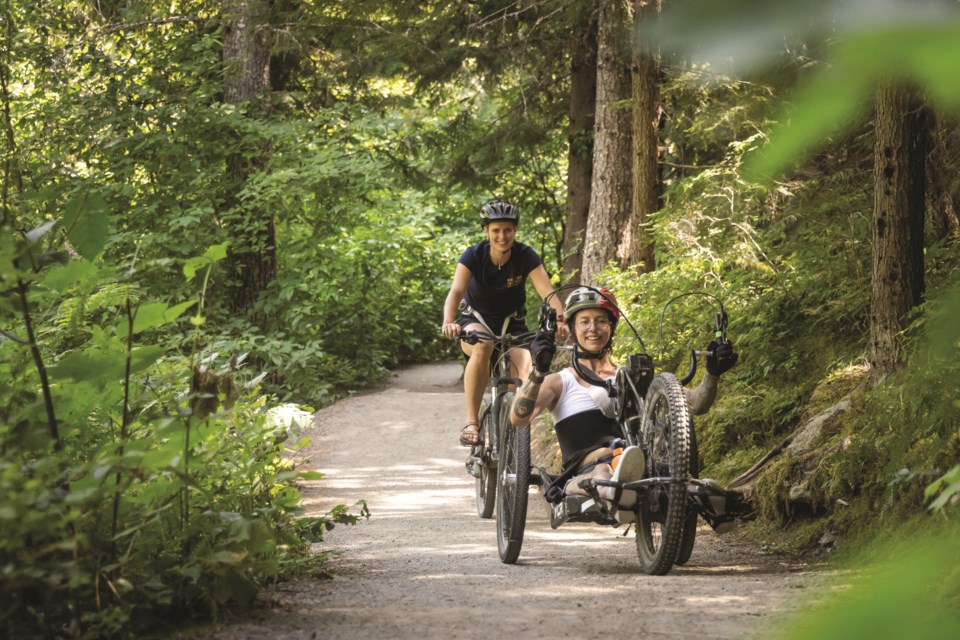A municipality with sidewalks lacking ramps to the street; plazas paved with bricks instead of smooth concrete; and buildings only accessible by stairs.
For most people, these features in our public spaces don’t even cross our minds. But for the differently-abled, the wheelchair bound, the elderly, and the like, such design choices can have a detrimental effect on how people experience the Resort Municipality of Whistler (RMOW).
To improve accessibility and meet new requirements set out by the provincial government, Whistler’s mayor and council voted at the Sept. 6 council meeting to adopt a new Accessibility Action Plan that addresses the municipality’s shortfalls in this area.
“The purpose of the Accessibility Action Plan is to provide actions that identify, remove and prevent barriers to individuals interacting with the RMOW in terms of workplace services and a built environment to be welcoming to people of all ages and abilities,” said RMOW accessibility coordinator Sarah Tipler in a presentation to council.
In June 2021, B.C.’s provincial government passed the Accessible BC Act, which set new standards for the province and required municipalities to have an accessibility committee, plan, and a tool to receive feedback on accessibility.
The measures are required to be implemented by all municipalities in the province by Sept. 1, 2023.
While Whistler already has an Accessibility and Inclusion Committee (formerly known as the Measuring Up Select Committee), “we recognized that we’d likely need to have an accessibility plan and that we also need a more comprehensive approach to incorporate accessibility into the way that we serve the entire community,” Tipler said.
The 58-page action plan focuses on 59 actions to be implemented, including new staff training and an assessment of current accessibility to public spaces, municipal facilities and the park/trail system.
Additionally, the plan seeks to make municipal housing more accessible and bring all new municipal developments up to the Rick Hansen Foundation Accessibility Certification (a national rating system that measures and certifies the level of meaningful access of buildings and sites) for all new municipal facilities and pedestrian environments.
The plan also recommends the RMOW update its Seniors Housing Policy to address specific aging-in-place features for all seniors housing units, and increase public awareness of the accessibility retrofit subsidy for private homeowners.
“The action plan includes the general actions of training and assessments, as well as actions that are framed by the following six areas: Service design and delivery; built environment; employment; communication; transportation; and procurement,” Tipler said.
According to Statistics Canada, in 2017, there were 6.2 million Canadians, representing about 22 per cent of the overall population, with a disability. With 38 per cent being 65 and over, and Canada’s population aging rapidly, the number of disabled Canadians will likely increase in the coming years.
The plan noted that Whistler has a younger population than the provincial average, with just 14 per cent of the population aged 60 or older. But by 2028, it is expected that the percentage of seniors will exceed the percentage of youth in the Howe Sound local health area.
Given the link between aging and disability, as Whistler ages, its accessibility needs will become more significant.
But the work the RMOW has already done to make Whistler an accessible community shouldn’t be understated. As the plan highlights, in the lead-up to and following the 2010 Olympic Games, the municipality made a concerted effort to improve accessibility in the Olympic Plaza and Gateway Loop.
Mayor Jack Crompton pointed to Whistler hosting the Paralympic Games and the coming 2025 Invictus Games as examples of events that have come to Whistler because of its existing measures and infrastructure.
“Accessibility is about including everyone. It ensures Whistler is designed for people with all abilities and at every life stage. This is a longstanding council priority and embedded in the RMOW’s Official Community Plan,” Crompton said in a release. “Inclusivity ensures each of us can participate fully. It accommodates the needs of an individual recovering from a sports leg injury and the person who enjoys Whistler’s trails on an adaptive bike, a parent pushing a stroller, people with sensory sensitivities or a person who has age-related sensory deterioration.”
From now on, an annual accessibility progress report will be brought before council, and updated every three years to reflect new data and priorities of the municipality. More information about accessibility in the resort is available on the RMOW's website.




